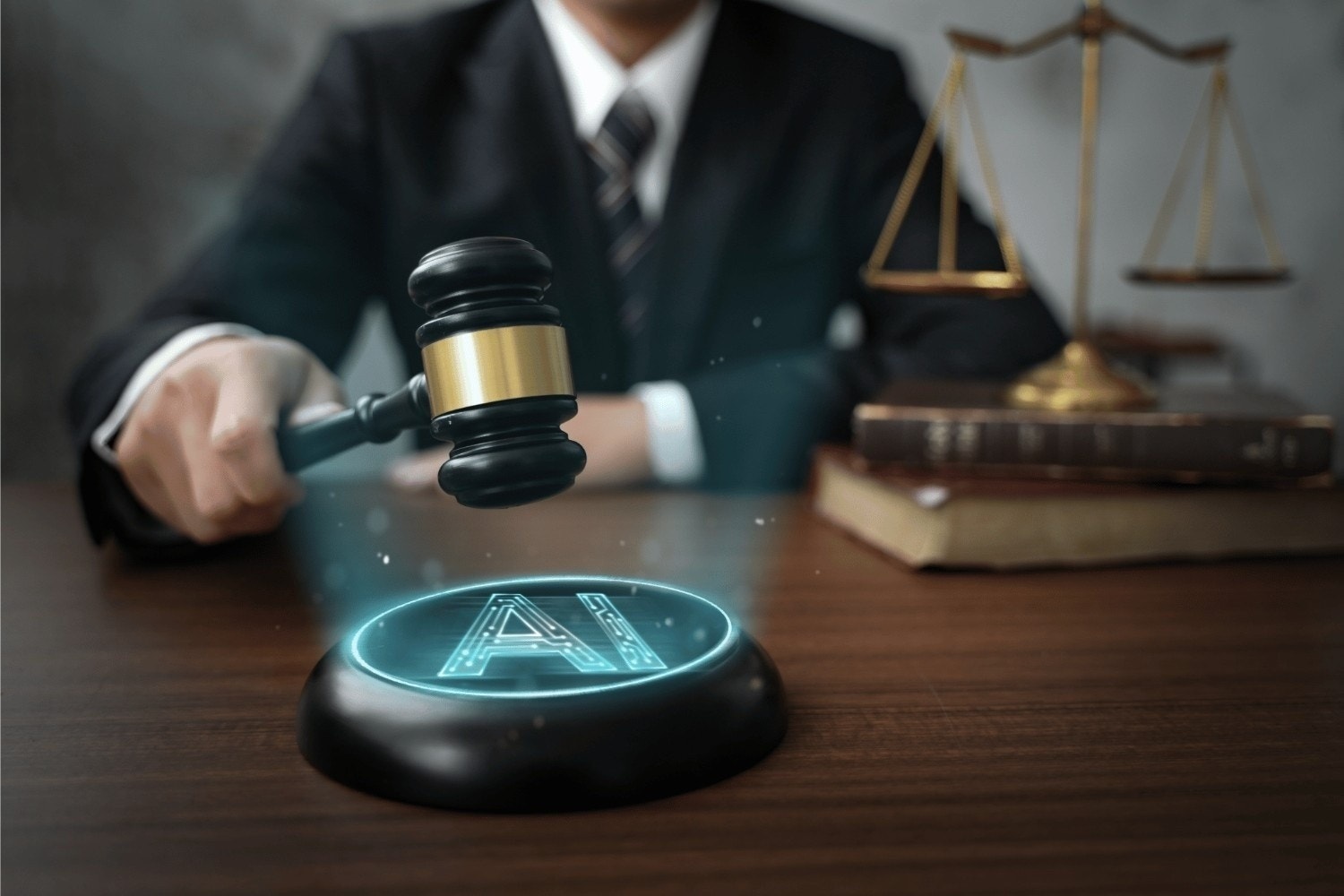Artificial intelligence is fast becoming one of the most debated technologies in the legal industry. According to a recent survey by Thomson Reuters:
"82% of lawyers think ChatGPT and generative AI could be applied to legal work. Interestingly, only 51% believe they should be."
However, most don’t realize that artificial intelligence has already been used in the legal sphere for years, mainly to assist with research and document review. With AI advancing at speed, though, there are now more ways that it could be applied.
In this blog, we discuss AI for lawyers, including how to use it and its benefits. We also look into the ethical considerations of adopting artificial intelligence within your legal practice and what to look for when choosing software.
Key takeaways:
AI can be used by legal firms to assist with research, automate document management, analyze contracts, and streamline communication.
AI can complete data-driven tasks faster than humans. This saves time and increases productivity.
When considering the use of AI, one of the main risks to manage is data privacy and security.
The creation of legal AI software requires collaboration between an AI expert and legal professionals.
Table of contents
What is artificial intelligence?
AI and law: How can artificial intelligence be used by legal firms?
The benefits of AI for law firms
The challenges and ethical considerations of AI for lawyers
The top features to look for in legal AI software
Will AI replace lawyers?
Artificial intelligence for lawyers: Revolutionizing the legal landscape
What is artificial intelligence?
So, let’s begin with the basics. In the most simple terms, AI or artifical intelligence is a computer that’s programmed to simulate human intelligence. It can learn to complete tasks like a person and communicate in a human-like way.
Facial recognition, search and recommendation algorithms, chatbots, and virtual assistants are all examples of artificial intelligence at work.
Generative AI
Artificial intelligence uses algorithms to analyze huge amounts of data. The difference with generative AI is it uses data to create something new, such as content, imagery, or even music. It’s developing at a rapid rate and has already come a long way from traditional AI, which could only make predictions.
One of the AI tools you’ll be most familiar with is ChatGPT—a chatbot that understands human communication and can respond conversationally. This type of artificial intelligence uses machine learning and natural language processing to create the most human-like experience possible.
When developed, ChatGPT was fed massive amounts of data from many different sources. Then, as users have increasingly interacted with it, it's learned to fine-tune its responses.
In the realm of business, AI’s capabilities extend beyond conversation and into practical applications like contract analysis. For example, for a quick and efficient review of your contracts using advanced AI technologies, such as AI contract review. These types of tools can help streamline complex legal processes by ensuring accuracy and consistency, saving valuable time.
In some ways, AI has already surpassed human intelligence. It can analyze data and make decisions much faster than we can. It also makes fewer errors and stores data to help it learn from past tasks.
As it develops further, its creators hope it will be able to make decisions and judgments just like a human.
AI and law: How can artificial intelligence be used by legal firms?
While there has been initial hesitation in embracing AI within the legal field, its adoption is rapidly growing. Every day, new AI-powered software tailored for the legal sector is emerging and being utilized by many industry professionals.
Let’s explore some popular AI use cases in legal:
Legal research
Legal research, a cornerstone of the legal profession, is being profoundly enhanced by AI technologies. Navigating through vast legal databases, statutes, and case laws is no longer a daunting, hours-long task. Advanced AI tools can swiftly parse through countless documents, pinpointing relevant case precedents, interpreting complex legal jargon, and presenting concise, actionable insights.
This speed and accuracy in research allow legal professionals to make more informed decisions, craft stronger arguments, and save invaluable time – all while ensuring they have the most current and pertinent information at their fingertips.
E-discovery and due diligence
Artificial intelligence was created to find patterns and trends in data, which is exactly what you need when looking for risks or liabilities in legal documents. Because of this, AI can speed up the discovery and due diligence process.
AI also has the added benefit of being unprejudiced, so it simply takes information at face value.
Document creation
Legal document creation, traditionally a meticulous and time-intensive task, is undergoing a revolutionary change with the advent of AI. Modern AI systems can now draft, review, and refine legal documents with a precision that matches, and often surpasses, human capabilities.
By analyzing vast repositories of legal texts, cases, and precedents, AI tools offer suggestions, auto-fill complex clauses, and can even forecast potential legal pitfalls.
Depending on the tool you’re using, you may also be able to auto-generate AI-driven documents using familiar workflows and relevant case information directly from data and documents pulled from within your case management system.
Analyzing contracts
AI is increasingly used in the legal industry to analyze contracts, too. This software utilizes machine learning and language analysis to inspect contracts and identify potential risks and compliance issues before they are signed.
While legal professionals should always complete their own review, AI may be a great addition to the contract or document review process. It can be fine-tuned to look at specific details, often picking up on issues that a human reader may miss.
Communication
The integration of Artificial Intelligence (AI) into communication processes within law firms is fostering enhanced client interactions and internal collaboration. AI-driven communication tools can streamline numerous aspects of client engagement, ensuring timely, personalized, and consistent correspondence.
Chatbots and virtual assistants, powered by AI, can manage initial client interactions, gather preliminary information, and answer routine inquiries, thereby providing instant responses and elevating client service levels. Internally, AI can organize and prioritize emails, set up meetings, and send reminders, ensuring that the communication flow within the firm is seamless and efficient.
The benefits of AI for law firms
For law firms striving for excellence, AI isn't just a tool—it's a game changer. Beyond the buzz and jargon, the real-world benefits of AI are tangible and transformative. From boosting productivity and ensuring impeccable accuracy to crafting client-centric approaches and optimizing financial operations, AI is redefining the benchmarks of success for law firms.
Increased productivity
The main benefit of using AI in law firms is the increased productivity rate. Many AI tools can complete repetitive, manual tasks like research and due diligence, freeing time to work on more complex legal matters. No longer mired in the minutiae, lawyers can handle more cases with greater efficiency.
Increased accuracy
Unlike humans, AI systems are immune to fatigue, cognitive biases, and oversights, ensuring that every piece of information is processed consistently and correctly. Whether it's scanning vast databases for relevant case law or cross-referencing intricate contract clauses, AI minimizes the margin for error, especially when done in combination with a human review which is highly recommended.
Client-centered law firms
Some see AI as a threat to human interaction, but when used correctly, it can actually enhance a client's experience. With all their time-consuming tasks under control, attorneys and lawyers have more time to spend with clients. This frees up additional hours for building relationships and discovering exactly what your clients seek.
More and more people expect a personalized approach, especially when they’re parting with significant sums of money. You can thus use technology to help you achieve this.
It saves money
Embracing artificial intelligence in the legal sector is not merely a trend; it's an investment in sustaining and propelling your firm into a future where efficiency and precision are paramount.
AI excels at executing repetitive administrative tasks with speed and unparalleled accuracy, thereby repositioning your team to focus on billable hours and intricate legal work.
By allocating administrative responsibilities to AI, your practice doesn’t just save money—it strategically reallocates resources to fuel growth, enhancing both short-term gains and long-term stability.
The challenges and ethical considerations of AI for lawyers
As a lawyer, you’re responsible for the legal futures of the clients you’re working for. Therefore, when using AI, there are many ethical considerations to examine.
Accuracy and reliability
The accuracy of artificial intelligence relies on the data it’s been fed. So, reliable AI not only depends on good programming but accurate sources. This is why developers and legal professionals must work together to make sure the software they create doesn’t become a hindrance rather than a help.
Things that can make AI unreliable include:
Hallucinations. These are responses that are not backed up by any data. They’re triggered by larger AI software that has been trained to create diverse responses. There's currently no way to fix these occasional blips, so monitoring AI output is essential.
Learned bias. This is more common in the legal industry because AI learns from past legal decisions and cases that may contain human bias. If enough data to support this bias is picked up, it will be incorporated into future decision-making.
Outdated information. Laws and regulations are constantly being updated, but artificial intelligence can only learn from the information and data it’s been given. So, it must be updated consistently.
Data security risks
With any new technology, there are also various concerns around privacy and security. Legal professionals handle a lot of confidential data and are responsible for keeping it safe.
AI needs data to do its job, but you must be mindful of what you allow it to access. Only feed it information that’s essential for its proper functioning.
Understanding the technology
Some people within the legal industry also think that artificial intelligence promotes laziness. Certainly, some are quick to adopt it without first doing proper research.
While you don’t need to be an expert to use AI, you should educate yourself enough to know how to use it responsibly. This is the only way to identify and solve the ethical challenges that may arise from incorporating it into your law firm.
The top features to look for in legal AI software
There’s much to consider when looking at new technology for law firms. Here are some of the features you should keep an eye out for when choosing AI.
Created by AI experts
Everyone is a self-proclaimed AI expert in 2024. Finding a well-established company to work with in this domain is important, especially for an industry as nuanced as legal.
Legal expertise
Embarking on a journey to implement high-quality artificial intelligence within a legal framework calls for aligning with a development team that not only excels in technology but deeply understands the nuances of the legal domain. Doing so ensures a synergy that amplifies the accuracy, efficiency, and reliability of the AI system within the legal context.
Usability
Your chosen AI should also be user-friendly and easily integrated into your workplace. Consider your team before you settle on a particular software—not everyone is an expert.
Data privacy and security
Naturally, security and data privacy is top of mind for users of AI. Consider using a case management platform that has native AI embedded within the system rather than using multiple third-party platforms.
When AI is embedded within your existing technological infrastructure, it reduces the need for excessive data transfers between platforms, limiting potential vulnerabilities and ensuring a more secure environment for sensitive legal data.
Moreover, a harmonious blend of AI and case management systems can prevent workflow interruptions, bolstering your team’s efficiency and ensuring that technology truly acts as an enabler, not a stumbling block, in delivering superior legal services.
Customer Support
A good thing to look for when researching AI is its customer support. What assistance is provided if you run into technical problems? Is there a helpline or online chat? Some AI tools come complete with online materials and resources, such as explainer videos and FAQs.
Will AI replace lawyers?
There are many benefits of using AI for lawyers, but many professionals are asking this: "Are we going to be replaced by AI?” An upgraded version of Chat GPT did pass the bar exam earlier this year. It also performed better than most graduates and can aid lawyers in their daily operations. But there are many reasons why artificial intelligence isn’t quite ready to practice yet.
The main problem is the AI hallucinations we mentioned previously. Occasionally, artificial intelligence generates false information that it confidently states as fact. This comes from being trained to give diverse responses. Until this can be fixed, it will always come a poor second to human intelligence.
Another problem comes from the way AI learns. By analyzing data from past cases, it may also take on any bias or prejudice that was inherent in these decisions. Every case must be judged on its own facts and merits, and artificial intelligence isn’t currently able to do this. These points bring up the issue of liability.
"Who’s liable if AI goes wrong? Would it be the law firm using it or its creators?"
Artificial intelligence can’t take accountability for its actions. Therefore, there’s no way it’s ready to give legal advice yet (or maybe ever).
What we’re more likely to see is an increasing incidence of virtual law firms. These are firms that work remotely without the need for office space. AI tech, such as chatbots and legal software, would be instrumental in creating them. Artificial intelligence may be on its way to innovating and improving the legal industry, but it will be a while before it can replace the invaluable work of trained lawyers.
Artificial intelligence for lawyers: Revolutionizing the legal landscape
In 2023, it’s arguably time for lawyers and legal professionals to adapt to this new technology and embrace the benefits of AI for themselves. But to ensure this move goes smoothly, you need tech that’s suited to your needs.
Learn more about NeosAI
If you’re looking for a tool that will unlock the expansive capabilities of AI throughout every phase of a case, maintaining consistency and efficiency within your case management platform, consider Neos.
Unlike other case management platforms that require you to exit the system to utilize AI technology—interrupting your concentration and adding an extra manual step to bring the AI content back into your case management software—NeosAI is embedded within the Neos case management platform, seamlessly accelerating your productivity in pre-existing workflows.
See NeosAI in action during this hands-on product tour and schedule a demo of Neos today!



